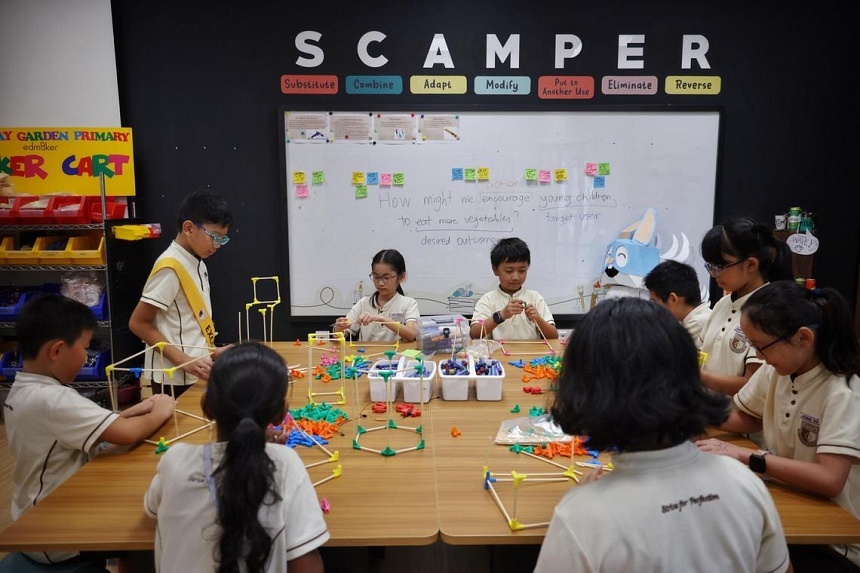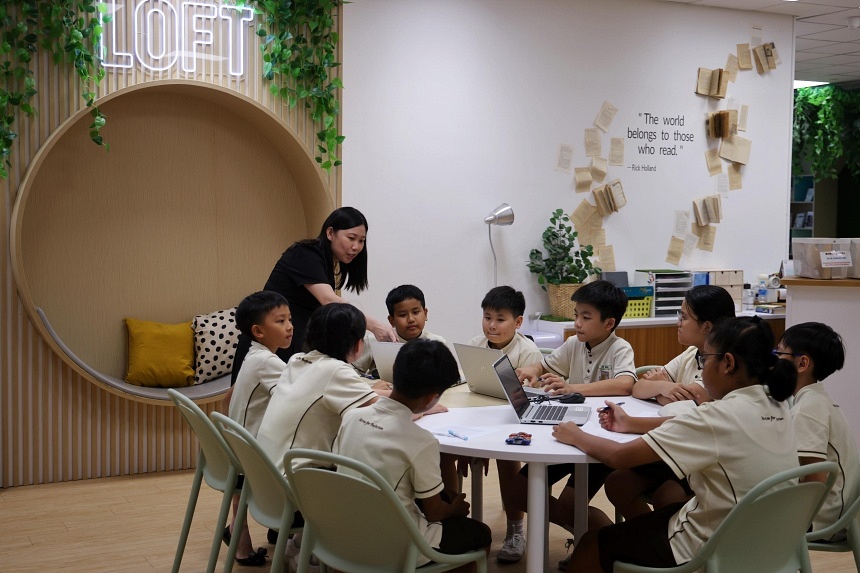SINGAPORE – All 180 primary schools in Singapore offer more challenging programmes for high-ability learners and are set to provide for more of such pupils in future, with the changes recently announced to the Gifted Education Programme (GEP).
The school-based programmes for higher-ability learners, which now cater to 7 per cent of each cohort, will expand to take in 10 per cent, or 3,000 pupils a year, Prime Minister Lawrence Wong announced in his maiden National Day Rally speech on Aug 19.
Pupils will no longer have to transfer to nine designated schools conducting the GEP, but will remain in their schools and participate in programmes for high-ability learners there.
This is part of a series of changes to the 40-year-old GEP, which in its present form caters to the top 1 per cent of pupils in each cohort.
All primary schools have teachers specially trained to teach high-ability pupils, and programmes catering to them, the Ministry of Education (MOE) said in response to queries on how widespread and resourced these programmes are.
High-ability learners can learn at faster rates and find, solve and act on problems more readily, as well as grasp and manipulate abstract ideas more easily, MOE said.
These pupils have access to programmes at their schools that are supported by the MOE headquarters in both academic and non-academic domains. The programmes enable high-ability learners to stretch their potential and develop their strengths and interests, the ministry added.
It said: “Many schools have also developed their own school-based programmes in other areas, such as coding and design thinking.
“All primary schools have teachers specially trained to teach these students.”
High-ability learner, or HAL, programmes, are provided in schools for pupils from Primary 4 to 6.
These pupils are identified using multiple sources of evidence, including teachers’ observations and academic results, and also by whether they display traits such as curiosity and enjoying problem-solving, primary schools told The Straits Times.
HAL programmes began in schools in Singapore in 2007 and take a variety of forms, including after-school enrichment or enhanced classes during normal curriculum time. They are based on specific subjects, or on themes like innovation.
Changes to the GEP mean these programmes will expand to take in more pupils, along with those who would previously have transferred to the gifted programme in another school.
Boon Lay Garden Primary School, for instance, offers enrichment programmes in several subjects, including languages, mathematics and science. It also has an innovation programme, and another on solving problems in the community.
About 12 per cent of each cohort from Primary 4 to 6 take part in such programmes, said a senior teacher for higher-ability learners at the school, Ms Grace Phang.
The lessons are designed to move past preparing pupils for tests. Ms Phang said: “The learning focus for our higher-ability learners has shifted from merely finding the ‘correct answer’ to approaching problems by questioning assumptions and proposing alternative solutions.”
For instance, pupils may need to take an active role in constructing their learning by posing questions and carrying out investigations to find answers to the questions, she said.
She added: “This fosters students’ curiosity, active problem-solving, develops their critical thinking and inventive thinking, and is conducted during curriculum time across the various subjects.”
The school also runs a bicultural programme, which aims to nurture pupils to have a strong understanding of Chinese, Malay and Indian cultures.
By the end of the programme, they are given opportunities to become cultural ambassadors, Ms Phang said.
Schools also tap existing programmes and resources from the GEP and MOE.
At Alexandra Primary School, about 10 per cent of pupils from Primary 4 to 6 are identified as high-ability learners in English language and are invited to participate in English enrichment.
The key programme for this is Reading Circles, designed by MOE for such learners and conducted weekly in sessions lasting 1½ hours each. In these sessions, pupils read and discuss a range of age-appropriate fiction and non-fiction texts, according to the MOE website.
Additionally, selected pupils are invited to take part in the Wits & Words debate competition for primary schools, organised partly by the Gifted Education Branch of MOE.
After an internal shortlisting, a team of five debaters will receive training, coaching and mentoring from the school’s teachers and experienced debaters or adjudicators recommended by MOE, said Ms Kua Li En, English language teacher at Alexandra Primary.

The school initiated the HAL programme for English language in 2017 to cater to the learning needs of pupils with high ability in and aptitude for the subject, said Ms Kua. Alexandra Primary also runs similar programmes for mathematics, science and innovation.
Ms Kua said: “Recognising that these students benefit from a curriculum that challenges them beyond the standard syllabus, we wanted to create a nurturing environment where they could explore and expand their language abilities.”
One such child is Primary 6 pupil Nathan Seetoh, 12, who had been selected for the GEP in Primary 3 and given the option to transfer out of the school, but chose to stay in Alexandra Primary so he would not be separated from his friends.
Nathan, who has taken part in HAL programmes in mathematics, science and English and his school’s innovation programme, said of the Reading Circles programme, which he has completed: “Reading Circles helped me understand the world around me and gave me the opportunity to learn and discuss something that was not within the main curriculum.
“We discussed issues surrounding World War II and made connections with our day-to-day lives.”
Teachers have been working to build up resources to run these programmes, with help from MOE.
At Queenstown Primary School, science department teachers worked together to build up resources and have been equipped with skills to stretch higher-ability learners, said the school’s science level head Liu Xi.
For the E2K Science programme – an HAL programme run by the school – teachers were centrally trained by MOE, she said. They would then work together to run the programme.
Said Madam Liu: “We can see science come alive and permeate through students’ daily lives from the projects they pursue. For instance, one group of students compared different types of potato chips and investigated the amount of oil they had.
“They pressed the chips on graph paper to quantify the amount of oil. I am truly impressed by the students’ curiosity in their daily encounters.”
The experience of working with pupils in the HAL programme has also been enriching for the teachers involved, Alexandra Primary’s Ms Kua said.
“Seeing the students’ genuine motivation to learn drives the teachers to prepare lessons that are not only engaging but also challenging enough to stretch their abilities.”


